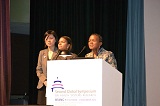 In 2010, young researchers from developing countries were invited by the Institute of Tropical Medicine (ITM) in Belgium to join in the scientific debate and actively participate in the First Global Symposium on Health Systems Research in Montreux, Switzerland.
In 2010, young researchers from developing countries were invited by the Institute of Tropical Medicine (ITM) in Belgium to join in the scientific debate and actively participate in the First Global Symposium on Health Systems Research in Montreux, Switzerland.
Over 300 researchers from developing countries responded to this call. 52 emerging voices from 26 countries and 5 continents were selected. The ITM team created a respectful and supportive space for sharpening our viewpoints.
Those of you, who attended the first symposium, may remember the innovative participation that “Emerging Voices” had in the closing ceremony. Three “Emerging Voices” had you on your feet. Our key message was that we believe in Alma Ata, we see health as a socio economic issue and a human right. We also called on the research community to view capacity building and mentorship of young researchers as an investment and key in achieving universal health coverage.
The presence of young and innovative minds offers an opportunity to look at old problems with fresh eyes. Some of our ideas were radical, for instance, Seye Abimbola from Nigeria, asked that we imagine a country without a health system. It’s hard to imagine. He asked us to consider wishing away the existing health systems. Seye’s intention was to push our thinking about health systems to include its ideals. Some ideas were not so radical, but simply pointed to unfinished research agendas, thus identifying areas of research that were not followed up such as, how to measure lay health worker attrition in developing countries.
Montreux is a happy memory now. As planned, our expert coaches continued to support us online and occasionally face-to-face. So far 28 “Emerging Voices” have had their articles published in peer review journals. This process requires discipline. For many of us, it’s has been long and challenging.
In the run up to the Second Global Symposium for Health Systems Research in Beijing, the “Emerging Voices” also contributed to a 26 country health systems research mapping exercise, which is one of the WHO health systems research strategy background papers. We did not only emerge as voices, but also in terms of our career progression, skills building, research agenda setting, and personal growth. It also helped us become more influential in our own countries and beyond, influencing future generations, who will hopefully make universal health coverage a reality all over the world.
Recently, the Peking University Health Sciences Center, Beijing hosted the “Emerging Voices” intensive training and preparations. From healthcare financing, knowledge translation, methodology in health services research and the contribution of BRIC countries to global health, we shared ideas, evidence, and viewpoints using non-traditional ways of communicating. During the two day preconference, we were joined by around 100 participants from all over the world. Beijing turns out to be an inspiring setting and from our fellow eight Chinese “Emerging Voices,” we learnt a great deal about the complex Chinese healthcare system, and how undesirable as it may be, top-down governance may achieve incredibly good results as in China’s progress towards universal health coverage.
The “Emerging Voices” programme together with other initiatives has created opportunities for young voices to be heard. Our expectation is that the symposium will start a conversation about how to actively involve young voices in international fora like this and in our own countries. We acknowledge that the systems for implementing this maybe non-existent in many countries. Perhaps, a place like this is where to start.
Lungiswa Nkonki is a specialist scientist, Medical Research Council, and a senior lecturer at Stellenbosch University, Cape Town, South Africa.
Mabel Carabali is an international consultant, Dengue Vaccines Initiative in Columbia.
Beverly Ho is an executive assistant, Philippine Health Insurance Corporation, Manila, Philippines.
The authors are part of the “Emerging Voices for Global Health” programme of the Institute of Tropical Medicine, Antwerp, Belgium (http://www.ev4gh.net). Run concurrently and in collaboration with the Global Symposium on Health Systems Research, the programme provides training, mentoring, and networking opportunities for promising young health researchers and professionals from low and middle income countries.
